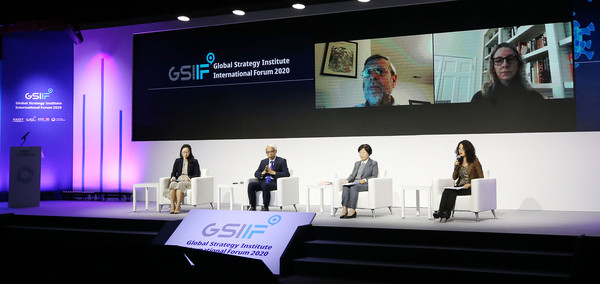On April 22, the KAIST Global Strategy Institute (GSI) held an international online forum on the topic of “Global Cooperation in the Coronavirus Era”. The GSI is a KAIST think-tank, launched in February, that has goals to identify global issues and suitable science-oriented responses. KAIST President Sung-Chul Shin began this event with opening comments that centered on the power of science and technology in future global governance. Other welcoming remarks highlighted medicine and healthcare, public health and prevention, and life and economy as the three critical areas for global cooperation. The importance of data science and technology in overcoming the COVID-19 crisis was also emphasized.

Keynote speeches by experts from various disciplines provided more in-depth insights into the responses to COVID-19 across different sectors. Arnaud Bernaert, the Head of Global Health and Healthcare of the World Economic Forum (WEF), started by stressing that new approaches and cooperation between multiple stakeholders are essential to develop a COVID-19 vaccine under such a short period of time. However, Jerome Kim, the Director General of the International Vaccine Institute (IVI), noted that completing a vaccine for COVID-19 within the next 12 to 15 months is very challenging, as vaccines normally take five to ten years to be officially proven safe for usage. The last keynote speech by Hongtaek Yong, a Deputy Minister in thes Ministry of Science and ICT, described Korea’s efforts to fight COVID-19. Some of them include producing genetic diagnostic reagents, collaborating with public-private organizations on big data projects, and actively participating in international cooperation by exporting COVID-19 test kits and sharing research results and knowledge.
The significant shift to an online society was also debated. Dr. Alexandros Papaspyridis, an education industry director of the Asia region of Microsoft, said that we have to prepare for “the new normal” as COVID-19 probably will not end anytime soon. The pandemic has presented us a huge opportunity to shift to a “phygital” (physical plus digital) world, and we should not go back to our old ways.
The forum continued with panel discussions on the pandemic’s impact on economy and education. David Dollar, a senior fellow at the Brookings Institution, said that instead of a rapid V-shaped recovery in the global economy, there will likely be a depression for at least the next two years. The co-director of the same institution, Rebecca Winthorp, emphasized the potential for negative impacts of online education on childrens’ development due to disparities in resource access outside schools. The roles of medical healthcare, AI, and IT technologies were also discussed. Professor Jinwoo Shin from the KAIST Graduate School of AI remarked that AI would help us analyze case data, discover appropriate cures, find critical patients quickly, and prevent the spread of COVID-19 in general.
Professor Joungho Kim, who organized the forum as the director of the KAIST GSI, concluded with the hope that the forum would provide valuable insights for everyone, during and after the COVID-19 pandemic.

